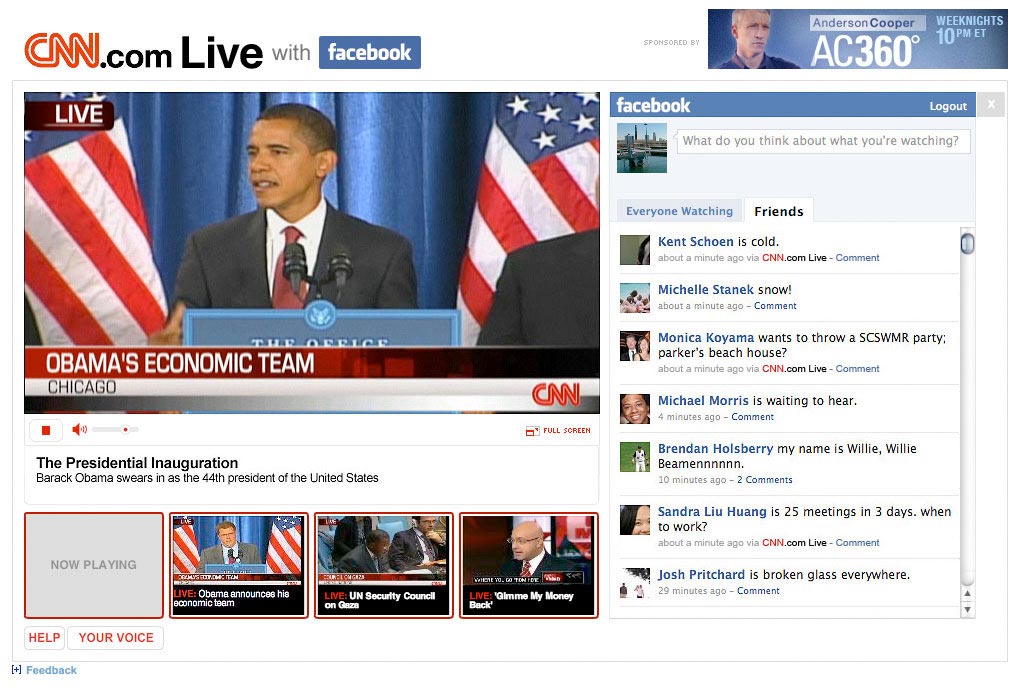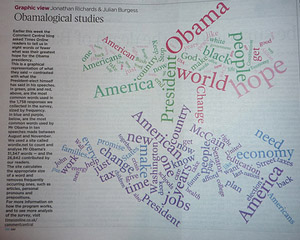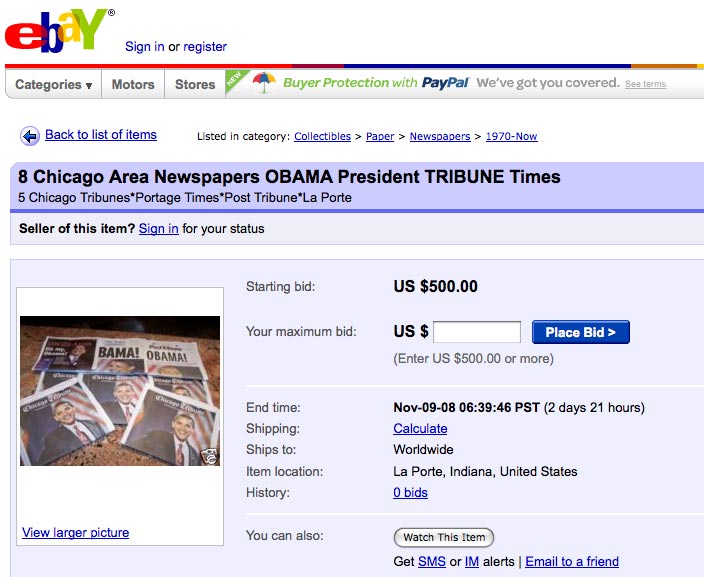In the build up to the inauguration of Barack Obama, US newspaper the Meridian Star has published an apology for the paper’s previous coverage of the civil rights movement.
Tag Archives: Barack Obama
Live coverage dominates media’s inauguration plans
Following up from last week’s post on CNN and NPR’s plans to get social with their coverage of Barack Obama’s inauguration as US President, the Associated Press (AP), Al Jazeera and Sky News have all announced plans to host their own online broadcast events:
AP
The agency will live stream the inauguration day events from 7am on its online video network, which is syndicated to partner newspaper and broadcaster websites, in a development of its live coverage of election night in November.
“AP Television News will provide unanchored coverage, from morning coffee at the White House, to the swearing-in ceremony, to the multi-camera shots of the inaugural parade. APTN, with access to dozens of pool cameras along with a dozen of its own, will have cameras in the crowds to capture the sounds and emotions of the millions who plan to attend,” says a release.
Al Jazeera English
The broadcaster will make the most of its recent deal with Livestation by hosting a live webchat on the platform between senior Washington editor Rob Reynolds and viewers on Thursday (Jan 15) at 9pm GMT.
Sky News
Sky News made use of plenty of multimedia and some streaming technology in its coverage of election night. On January 20 a news package ‘Obama: The Inauguration’ will be shown in high definition online and live streaming of the inauguration ceremony from 5pm GMT will also feature.
News sites get social for Obama inauguration
To mark President Elect Barack Obama’s inauguration on January 20, news sites are plotting and planning their online coverage already:
CNN
CNN’s going for the social networking angle, teaming its live video streaming site, CNN.com Live, with Facebook. Users will be able to update their Facebook status from the CNN site and see a stream of updates from their friends.
The updates entered via CNNLive will be tagged with the hyperlink ‘via CNN.com Live’ so Facebook contacts can click through to view the inauguration site from the social network.

NPR
At the end of last year, NPR used its inside blog to put a call out for social media ways to cover the inauguration. Among the ideas mooted in the post were:
- Citizen journalism iPhone app
- ‘Mobcasting’ – audio recordings of voicemails left by listeners about their experiences of inauguration day
- An inauguration #tag – for Twitter, Flickr, blog posts etc. The tag #inaug09 seems to be in use already.
- Maps of user-generated content
More help is wanted from techies and journalists – contact Andy Carvin (@acarvin on Twitter) via the blog post.
AP: Top 10 news stories of the year
Barack Obama’s election victory named top news story of 2008 in Associated Press’ annual poll, voted for by US editors and news directors.
Oil prices, the Beijing Olympics and Mumbai terror attacks all feature in the list.
The New Republic: Why journalists should benefit from Obama’s ‘New Deal’
With suggestions that president-elect Barack Obama is going to resurrect a Roosevelt style New Deal programme, Mark I. Pinsky says writers and journalists should be involved and put to use for public and social works.
FT.com: Gideon Rachman on getting ‘Drudged’
“There is an unbelievable amount of anger and hatred out there – directed at everything from the United Nations to big business to Barack Obama. These people can read, but they cannot think,” says Rachman after receiving more than 200 emails following an article picked up by the Drudge Report.
Developers get bylines too in the Times
Thanks to Tom Whitwell, assistant editor for Times Online, for bringing this to our attention: today’s print edition of the Times complete with joint byline for developer Julian Burgess.
The graphic printed was a visualisation of answers to a blog post on the Times’ Comment Central, which asked readers what their biggest hope for President elect Barack Obama was.
Obama2008.s3.amazonaws.com: Obama victory newspaper front pages
A montage of newspaper front pages from the day after Barack Obama won the US Presidential election.
Election day newspapers sold on eBay
Following reports that the print editions of certain US newspapers sold out after Barack Obama was declared President elect, some ‘collector’s copies’ have appeared on eBay.
How about $80 for this edition of the New York Times from yesterday? You get a ‘resealable plastic envelope’ too.

Not a fan of the Times? Well, why not snap up these eight papers from the Chicago area for just $500. No bids as yet, so if you’re quick…
A new online revenue stream for the traditional printed paper perhaps?
So was it the ‘Blogs Wot Won It’ for Barack?
So it doesn’t need saying that US Election 2008 took place in a very different media climate from the one experienced in 2004: just take a look at CNN à la 2004, and CNN right now.
It’s hard to actually think back and remember that four years ago the focus for many of this year’s online followers was still on the TV screen.
Last night we followed live-streams. We Twittered. We traced maps. We enjoyed striking homepage designs as the results came in.
This was the year for multimedia to really come into its own. The public outside the electoral college had a chance to participate from afar. Many bloggers might not have had a vote, but they could be influential: by spreading round a Sarah Palin debate flow-chart, casting a vote on a remote voting map, or putting a supporting button onto their sites (the online version of the rosette).
MercuryNews.com gave these, as the ninth and tenth reasons for McCain’s defeat:
9. “The Internet. Obama broke an earlier pledge and opted out of public financing, allowing him to raise at least $200 million in September and October, in millions of donations averaging $86. He raised more than twice as much money as McCain, and was able to pay for staff and ads in states and in numbers that McCain could only dream about. His 30-minute infomercial six days before the election drew more than 34 million viewers — more people than watched the finale of ‘American Idol’ last year or the final game of the World Series.”
10. “Better ground game. Obama mobilized young people and used technology, from text messages to internet meet-ups, in ways that built the first truly 21st century campaign. It might have brought guffaws at the GOP Convention, but it turns out that being a ‘community organizer’ is a good skill to have when running a presidential campaign.”
Obama’s campaign page thanks the various efforts of his internet supporters, links to his mobile content, and shows where you can find ‘Obama everywhere’:
And what about the negative effect for McCain? You may have your reservations about this story, but Fox News reported in July how McCain supporters could have been hijacked through spam reports to Google Blogger, prompting a Republican blogger move over to WordPress.
Renee Feltz, over at the Columbia Journalism Review, looks in detail at whether McCain was ‘blogged down in the past’ with ‘top-down internet tactics’, which left him unable to keep up with Obama’s social networking strategy.
This diagram shows the online blog cluster:

(screenshot, courtesy of Morningside Analytics via CJR)
Feltz describes how the map “shows a ‘halo’ of about 500 relatively new blogs in two isolated clusters. One cluster includes several hundred anti-Obama blogs (orange) and the other contains several hundred pro-McCain and pro-Palin blogs (green).”
Their isolation shows that they are not well-connected to political blogs with the longer histories, a point which John Kelly, Morningside’s chief scientist and an affiliate of the Berkman Center, explains on the CJR post.
Please do add your own Obama bloggin’ thoughts here. Was is the blogs, and which ones, which gave Obama strength? And what should we expect on the multimedia horizon for 2012?

